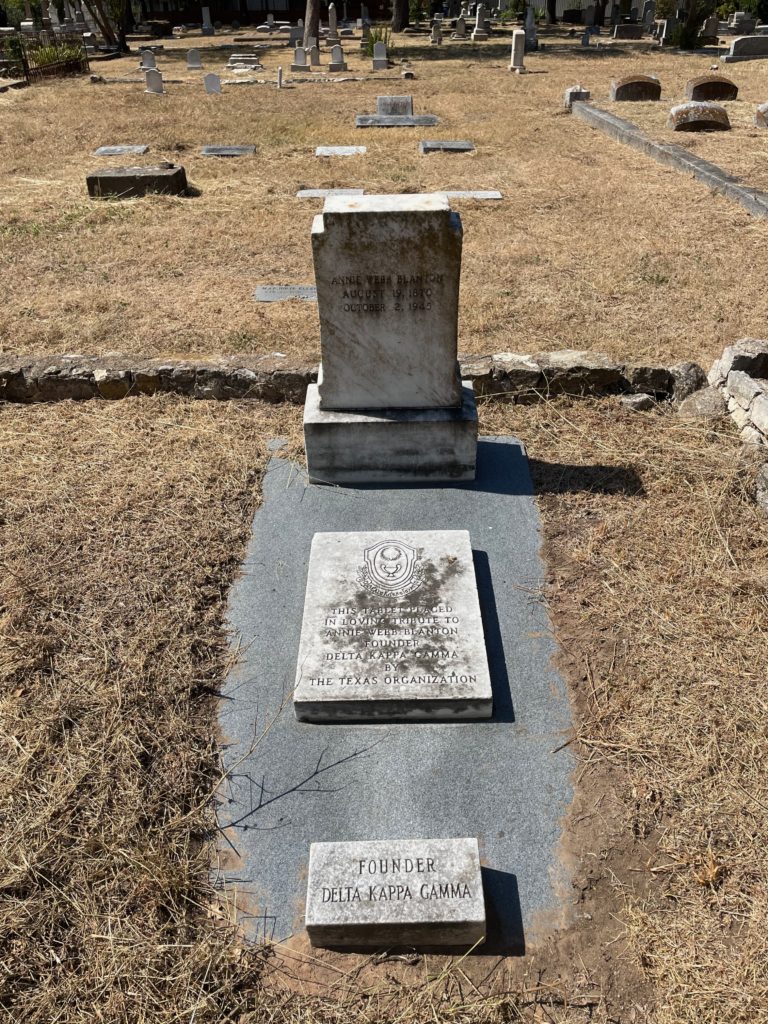Erik Visits an American Grave, Part 1,283
This is the grave of Annie Webb Blanton.

Born in 1870 in Houston, Texas, Blanton grew up pretty well off, though her mother died when she was 12. By that time, the family was living in the town of LaGrange, Texas. Many in her family were able to go to college at a time that was not common, including herself. Her brother was Thomas Blanton, who later served in Congress for two decades and was nearly expelled for entering a letter in the Congressional Record that had curse words in it. The horror.
But they weren’t real rich and she had to work to earn her tuition. She graduated from high school and then taught for several years in the small towns of Texas, where you didn’t need much in the way of higher education to teach, saving her money for her education. She went to the University of Texas, where she finished a degree in literature in 1899. Now a very well-educated woman for her time, she was able, with only a bachelor’s degree, to become a professor at the North Texas State Normal College (today the University of North Texas) in 1901. She stayed in Denton until 1918 when she moved back to Austin to be on the faculty of the University of Texas. She was an education professor. She did want more education and UT had space for her to do this. So she got a master’s degree from the institution in 1923 and then went on to a PhD at Cornell, which she received in 1927. She was active in her world and was elected to head the Texas State Teachers Association in 1916.
Moreover, Blanton was an accomplished scholar of education. She published Review Outline and Exercises in English Grammar in 1903, A Handbook of Information as to Education in Texas in 1923, Advanced English Grammar in 1928, and The Child of the Texas One-Teacher School in 1936. OK, maybe these don’t sound super interesting, except perhaps for the latter, but future scholars will say that about most of our books today. She also founded the first honor society for women educations, Delta Kappa Gamma.
So far, this sounds like a woman who was pretty good at her job and opening up opportunities for herself at a time when women didn’t have so many opportunities. This was true, but there’s more. For Blanton became one of most important activist women in the history of Texas. She was a major suffragist in a state where that was not so supported. In fact, Texas was not the most retrograde state when it came to women’s suffrage, having legalized it in just before the primaries in 1918. This probably came out of the rural socialism of the time that had a lot more room for social change, so long as it didn’t impact the racial order, than it does today. The next year, the state became the first in the south to ratify the 19th Amendment. Blanton was a major player in the state on this issue.
In fact, Blanton decided not only to push for the vote, but to run for office. In 1918, she ran for State Superintendent of Public Education. And she won that race. This makes her the first woman to hold statewide office in Texas (or maybe any office). This was a big deal in the Texas suffragist community. In fact, her campaign manager was Minnie Fisher Cunningham, a long-time suffragist who in 1928 became the first woman to run for the Senate from Texas and was later a huge New Dealer in that key state. This campaign was seen as something not only for teachers, but for women. She was good at it too. She achieved a major victory in the job. Texas schools were terrible. Underfunded and ignored, lots of kids were not getting even rote educations. She launched something she called the Better Schools Campaign (the name itself even sounds like something from the Progressive movement). This called for an amendment to the state constitution that allowed towns to raise property taxes to fund local schools. Pretty basic stuff, but that wasn’t allowed in Texas before this. I wouldn’t say Texas education became great or anything after this, but at least one step was taken. Greg Abbott probably wants to see it overturned.
This was a two-year term and Blanton won re-election in 1920 before deciding not to run for a third term in 1922 so she could run for Congress. That bid went nowhere. So Blanton worked on her graduate education.
Whether or not Blanton was a lesbian is up for debate. Like most of these debates around women of a century ago, it’s not a very useful one. She did have a long time “friend” who she lived and traveled with named Emma Mitchell, who was also a teacher. Was that relationship sexual? Does it matter? Since I don’t think we can answer the former question, it makes the second question a complicated one to answer.
Blanton died in 1945. She was 75 years old. She was buried with her family and not Mitchell, make of that what you will.
Annie Webb Blanton is buried in Oakwood Cemetery, Austin, Texas.
If you would like this series to visit other pioneering women office holders in various states, you can donate to cover the required expenses here. Gertrude Walton Donahey, who became the first statewide woman to win office when she became State Treasurer in Ohio in 1970, is in New Philadelphia, Ohio. Annie White Baxter, who was the first woman elected to any office in Missouri in 1908 and the first woman to be elected county clerk anywhere in the United States, is in Jefferson City, Missouri. Previous posts in this series are archived here.


